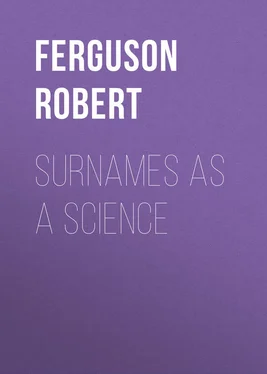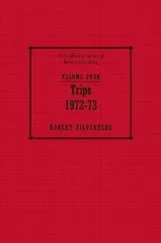Robert Ferguson - Surnames as a Science
Здесь есть возможность читать онлайн «Robert Ferguson - Surnames as a Science» — ознакомительный отрывок электронной книги совершенно бесплатно, а после прочтения отрывка купить полную версию. В некоторых случаях можно слушать аудио, скачать через торрент в формате fb2 и присутствует краткое содержание. Жанр: foreign_antique, foreign_prose, на английском языке. Описание произведения, (предисловие) а так же отзывы посетителей доступны на портале библиотеки ЛибКат.
- Название:Surnames as a Science
- Автор:
- Жанр:
- Год:неизвестен
- ISBN:нет данных
- Рейтинг книги:3 / 5. Голосов: 1
-
Избранное:Добавить в избранное
- Отзывы:
-
Ваша оценка:
- 60
- 1
- 2
- 3
- 4
- 5
Surnames as a Science: краткое содержание, описание и аннотация
Предлагаем к чтению аннотацию, описание, краткое содержание или предисловие (зависит от того, что написал сам автор книги «Surnames as a Science»). Если вы не нашли необходимую информацию о книге — напишите в комментариях, мы постараемся отыскать её.
Surnames as a Science — читать онлайн ознакомительный отрывок
Ниже представлен текст книги, разбитый по страницам. Система сохранения места последней прочитанной страницы, позволяет с удобством читать онлайн бесплатно книгу «Surnames as a Science», без необходимости каждый раз заново искать на чём Вы остановились. Поставьте закладку, и сможете в любой момент перейти на страницу, на которой закончили чтение.
Интервал:
Закладка:
But to return to Bass, let us see what can be done to bridge the gulf between the princely brewers of to-day and the old potter on the banks of the Rhine. And first, as to Anglo-Saxon England, we find Bass as a mass-priest, and Bassus as a valiant soldier of King Edwin in the Anglo-Saxon Chronicle , as also a Bassa in the genealogy of the Mercian kings. Basing, the Anglo-Saxon patronymic, "son of Bass," occurs about the twelfth century, in the Liber Vitæ . And Kemble, in his list of Anglo-Saxon "marks," or communities of the early settlers, finds Bassingas, i. e. descendants or followers of Bass, in Cambridgeshire and in Notts, while Mr. Taylor finds offshoots of the same family on the opposite coast in Artois. In Germany we find many instances of Bass, and its High German form Pass, from the seventh century downwards. And in the neighbourhood of the Wurm-See, in Bavaria, we find, corresponding with our Bassings, a community of Pasings, i. e. descendants or followers of Pass. We may take it then that our name Pass is only another form of Bass , both names being also found at present in Germany. As to the origin of the name, for which no sufficient explanation is to be found in the Old German dialects, Foerstemann has to turn to the kindred dialect of the Old Northern, where he finds it in basa , anniti, to strive contend.
Thus far we have had to do with Bass as a name of Teutonic origin. But it appears to have been a Celtic name as well, for Bassa, a name presumably Welsh, occurs in the pathetic lament of Llywarch, written in the sixth century, the name being, on the authority of the late Dr. Guest, still retained in Baschurch near Shrewsbury. The name Bass, then, or Pass, on Roman pottery might be either that of a German or of a Gaul, but more probably the former, especially as we find also Bassico, a form more particularly German, and some other forms more probably Teutonic.
Before parting with Bass, I may refer to one in particular of his progeny, the name Basin , formed from it by the ending en or in , referred to in a subsequent chapter. The original of our Basin has been supposed to have been a barber, the mediæval leech, but I claim for him a different origin, and connect his name, which is found as Basin in Domesday, with the name Basin of a Thuringian king of the fifth century.
Let us take another of our common surnames, Scott . This has been generally assumed to have been an original surname derived from nationality, and we need not doubt that it has been so in many, perhaps in most, cases. But Scott, as a man's name, is, not to say older than the introduction of surnames, but as old probably as the name of the nation itself. To begin with England, it occurs in the thirteenth century, in the Liber Vitæ , where it is the reverse of a surname, Scott Agumdessune (no doubt for Agemundessune). I do not think, however, that Agumdessune is here a surname, but only an individual description, an earnest of surnames that were to be. For there is another Scott who signs about the same time, and it might be necessary to distinguish between these two men. There is in the same record yet another Scott, described as "Alstani filius," who, in the time of William the Conqueror, "for the redemption of his soul, and with the consent of his sons and of all his friends," makes a gift of valuable lands to the Church. Scott again occurs in an Anglo-Saxon charter of boundaries quoted by Kemble, "Scottes heal," i. e. "Scot's hall." And Scotta occurs in another in "Scottan byrgels," i. e. "Scotta's burial mound." In Germany Scot occurs in the ninth century in the Book of the Brotherhood of St. Peter at Salzburg, where it is classed by Foerstemann as a German name, which seems justified by the fact that Scotardus, a German compound ( hard , fortis), occurs as an Old Frankish name in the time of Charlemagne. In Italy, where, as I shall show in a subsequent chapter, the Germans have left many Teutonic names behind them, we find a Scotti, duke of Milan, in the middle ages, whose name is probably due to that cause. Scotto is a surname at present among the Frisians, while among the Germans generally it is most commonly softened into Schott.
Scot however, as a man's name, seems to have been at least as common among the Celts as among the Teutons; Gluck cites four instances of it from ancient, chiefly Latin, authors, in only one of which, however, that of a Gaul, is the particular nationality distinguished. As to the origin of the name, all that can be said is that it is most probably from the same origin, whatever that may be, as the name of the nation; just as another Celtic man's name, Caled, signifying hard, durus, is probably from the same origin as that of Caledonia, "stern and wild."
Lastly, among the names on Roman pottery, we have Scottus, Scoto, and Scotni, the last being a genitive, "Scotni manû." Of these three names the first is the Latinisation of Scott; the second has the ending in o most common for men's names among the old Franks, but also found among the Celts; the third, as a genitive, presumably represents the form Scotten, the ending in en , hereafter referred to, running through the whole range of Teutonic names, but being also found in Celtic. Upon the whole, then, there does not seem anything sufficiently distinctive to stamp these names as either Teutonic or Celtic. I may observe that all these three forms, Scott , Scotto , and Scotten , are found in our surnames, as well as Scotting , the Anglo-Saxon patronymic, which assists to mark the name as in Anglo-Saxon use. We have also Scotland , which has been supposed to have been an original surname derived from nationality, and so I dare say it may be in some cases. But Scotland appears as a man's name in the Liber Vitæ about the twelfth or thirteenth century, and before surnames begin to make their appearance. Scotland again occurs as the name of a Norman in the Acta Sanctorum , where it seems more probably of Frankish origin, and cannot at any rate be from nationality. The fact seems to be that land , terra, was formed into compounds, like bald , and fred , and hard , without reference perhaps to any particular meaning. Similarly we find Old German, apparently Frankish, names, Ingaland and Airland (more properly Heriland), which might account in a similar way for our surnames England and Ireland .
Let us take yet one more name, Gay , a little more complicated in its connections than the others, and endeavour to trace it up to its origin. "Nay! but what better origin can we have," I can fancy the reader saying at starting, "than our own word 'gay', French gai ?" I would not undertake to say that our name is not in any instance from this origin, but what I say is that a proved Anglo-Saxon name is better than any assumed word , however suitable its meaning may seem to be. Moreover, the same Anglo-Saxon word will account, not only for Gay, but for a whole group of names, Gay , Gye , Gedge , Gage , Kay , Key , Kegg , Kedge , Cage , – all variations, according to my view, of one original name. It must inevitably be the case that a name dating back to a remote antiquity, and in use over a wide area, must be subject to many phonetic variations. And it matters nothing to etymology, so long as her own strict rules are complied with, if some of these names have not a single letter in common. Given, then, an Anglo-Saxon name Gagg, Gegg, with its alternative form Cagg, Keg, and we get from it all the forms that are required. For the English ear is averse, as a matter of euphony, to a final g , and while it most commonly changes it into y (which is in effect dropping it), as in A.S. dag , Eng. day , A.S. cæg , Eng. key , it also not unfrequently changes it into dg , as in A.S. bricg , Eng. bridge , &c. To come, then, to the Anglo-Saxon names concerned, Kemble, in his list of original settlers, has both Gagingas, i. e. descendants or followers of Gag, and Cægingas, i. e. descendants or followers of Cæg. And the Anglo-Saxon names cited below, one of them the exact counterpart of Gay, are deduced from place-names of a later period. The Old German names do not, in this case, throw any light upon the subject, as, on account of the stem not being so distinctly developed as it is in Anglo-Saxon, they have been placed by Foerstemann to, as I consider, a wrong stem, viz. gaw , patria.
Читать дальшеИнтервал:
Закладка:
Похожие книги на «Surnames as a Science»
Представляем Вашему вниманию похожие книги на «Surnames as a Science» списком для выбора. Мы отобрали схожую по названию и смыслу литературу в надежде предоставить читателям больше вариантов отыскать новые, интересные, ещё непрочитанные произведения.
Обсуждение, отзывы о книге «Surnames as a Science» и просто собственные мнения читателей. Оставьте ваши комментарии, напишите, что Вы думаете о произведении, его смысле или главных героях. Укажите что конкретно понравилось, а что нет, и почему Вы так считаете.












